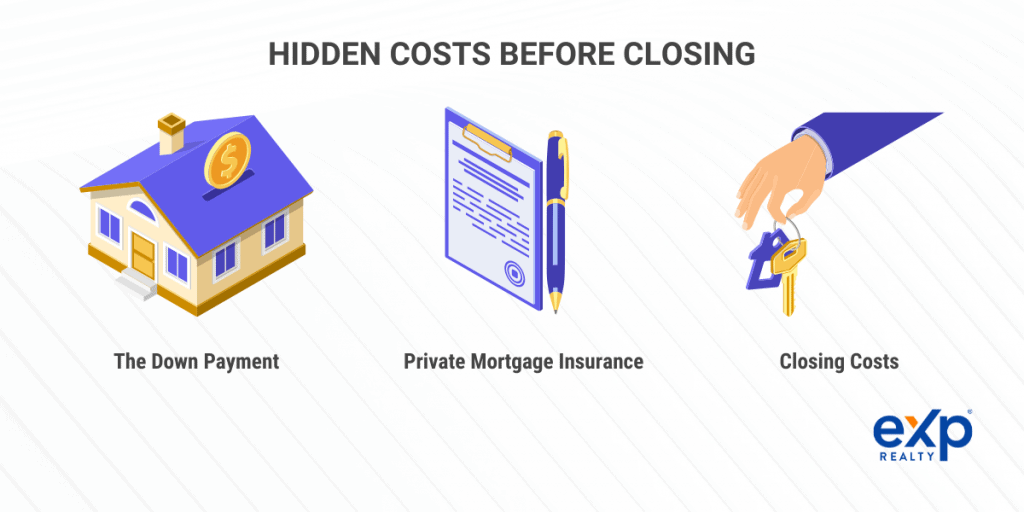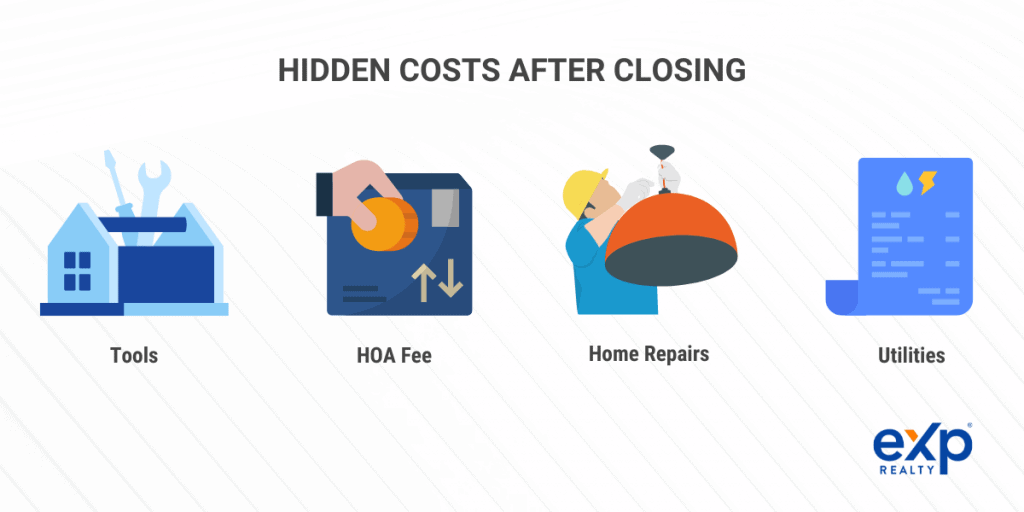Buying a home comes with many price tags, some up-front and some you might not see coming. Whether you’re looking for a home in Atlanta Real Estate or in the middle of Nebraska, you’ll find there are plenty of payments to be made that most people who haven’t bought a house don’t know about. Get ahead of the curb and get a handle on the hidden costs of buying and owning your home.
To help organize this list, we’ll divide the hidden costs of buying and owning your home into before and after closing sections.
Hidden Costs Before Closing

The Down Payment
Though you’ll be mostly paying off your house in small monthly installments, you’re going to have to put some money upfront to get your foot in the door. The homebuyer has some power over how much they’ll pay as the down payment. The average down payment in the U.S. is about 3% of the purchasing price, but you can pay as little as 0% for some first-time buyers. You can also pay as much as 20% and save money in the long run as well as avoid the next hidden cost on our list.
Private Mortgage Insurance (PMI)
Though this varies from lender to lender, usually if your down payment is less than 20% of the purchase price, you’ll have to pay for private mortgage insurance to protect your lender in case you default on your loan. PMI is typically paid as .5% to 1% of your loan per year and is rolled into your monthly mortgage payment.
Closing Costs
Closing costs are not one payment but many smaller payments all grouped together. Officially, they are the “cost of doing the loan. Think of these as “processing fees.” We’ll go into the most prominent of them, but taken all together you can expect closing costs to be between 2% and up to 5% of the purchase price of your home.
- Loan Origination Fee – Your lender will vet you and check your credit history, employment record, etc to make sure they’re not taking on too much risk. The lender charges you for this process. Usually, the fee comes to .5% and 1% of the loan.
- Home Appraisals and Survey fees – To figure out the fair market value of your home and thus the loan amount, the lender will authorize an appraisal and/or survey of your home. The buyer picks up the cost of this appraisal, which usually runs for a few hundred dollars.
- Real Estate Attorney – In about 2/5s of all states in the U.S. an attorney is required for a real estate transaction to be legal. It’s best to check first whether you’ll need an attorney in your state or not, and once you have a real estate agent, you can work with them to find the best attorney. In some states, you’ll have an attorney that represents you and in other attorney based states the attorney will actually represent the lender (not you). However, in those states it’s not customary to hire an attorney for yourself. Check with your agent to find out what the common practice is.
- Title Insurance – Often overlooked but well worth the cost, title insurance is a necessity in the home buying process. You (and sometimes your lender) will pay title insurance to your title company. First, a title company makes sure that the title of your property, i.e. the document of legal ownership that the legal owner holds, is actually in your possession when you close on the house. Without the title to your home, you don’t legally own the home. Title companies do what real estate attorneys do in that they check the history of your home, making sure that the title was legally transferred from owner to owner over the years. If, in the case that someone challenges your claim to the title of your house, your title insurance will kick in and help cover the costs of you combatting that challenge. Title insurance is typically .5% to 1% of the price of your home.
- Homeowner’s Insurance – As with all insurance, homeowner’s insurance helps you pay for things when something goes wrong. Homeowner’s insurance varies widely in cost and coverage from area to area. If you live in a place with considerable risk of forest fires, floods, tornadoes, hurricanes, etc. you’ll pay more for homeowner’s insurance to compensate for that risk. Usually, you’ll pay off the first year of homeowner’s insurance upon closing.
Other Out of Pocket Expenses
- Home Inspection – Rather than check the value of your home, the home inspection checks the structural integrity and often gives you a good estimate of the problems and connected costs you’ll encounter with the home in the future. A good home inspection is well worth the average $500 you’ll spend, as it can save you from a real headache in the future, like finding an undisclosed problem with the house, or prepare you for that headache if you choose to go forward with the home anyway.
- Surveys – in some states and in rural areas it’s common to get a survey. A survey is where a surveyor comes out and maps out the property based on the legal description. This is useful is there is ever any disputes after the closing about where fences can go, and who owns what trees.
Hidden Costs After Closing

Tools
Ta-da, you just bought your home, and now you get to fix it! Things go awry in anything as big and complicated as a house. Fortunately, you can make lots of small repairs on your own with common screwdrivers, hammers, pliers, wrenches, and on. If you don’t have these tools already, be prepared to head to the hardware store frequently.
Also, be sure to pick up a lawnmower if you don’t already have one. Especially if you are living under an HOA which will want your yard to look groomed, leading us to our next hidden cost.
HOA Fee
HOAs are great in keeping the neighborhood looking good and protecting everyone’s home appreciation rates. HOAs will make you money in the long run by making sure your home gets appraised well when lenders check out your neighbors’ property. Typically HOA fees run between $150 and $350 a month.
Home Repairs
Be prepared to set aside a good bit of money each month to tackle problems both big and small that arise with your home. These can be as small as a hole in the drywall or a roof replacement. On average, Americans spend a little over $3,000 a year on repairs for their home, but something big like replacing a roof can cost around $13K-$15K. Through homeowner’s insurance, you’ll only have to cover the deductible.
Utilities
Those used to renting might remember that extra charge on top of your rent known as utilities. That charge is much larger in a house that must heat and cool several rooms, pump water into the house, and provide electricity for myriad appliances. One great way to prepare for your utility bills is to request the previous homeowner’s records on utility payments during the home buying process. A good rule of thumb is to expect to pay around $2,000 a year for utilities. Hidden
Costs of Buying and Owning Your Home
We don’t mean to scare you off from homeownership but to prepare you for the responsibilities and extra costs of owning a home. It’s quite an investment, and it’s better to know how much you’ll pay than going in blindly and realizing only later on that you can’t afford the home you’re in. Save money, save hassle, and save yourself from worry by knowing the hidden costs of buying and owning your home.





